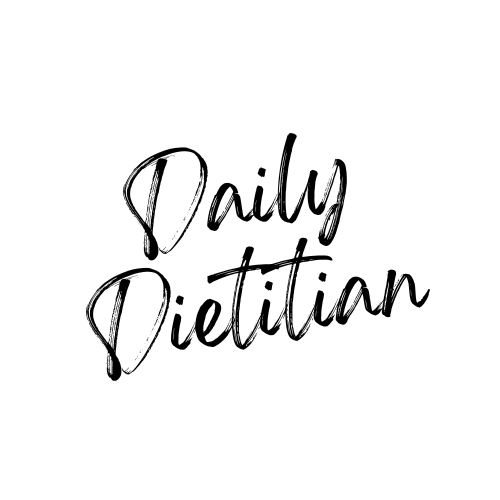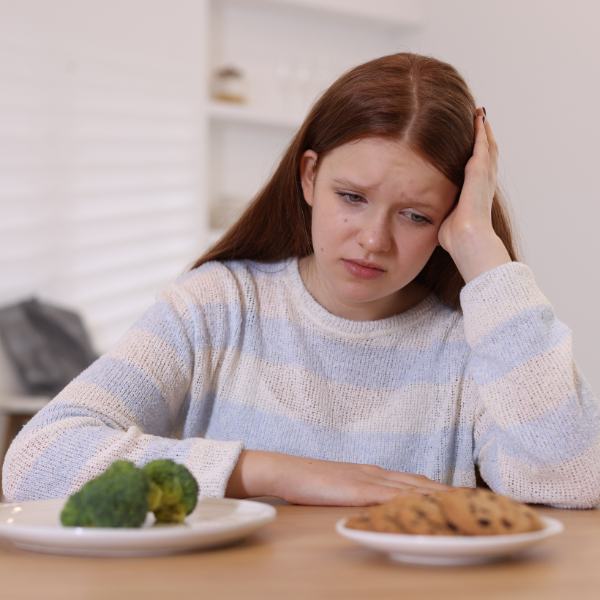A Dietitian Explains the Warning Signs Hiding in Today’s Trendiest Diets
If you’re someone who tries to eat healthy, stay disciplined, and follow the latest wellness trends… you’re definitely not alone. But here’s the question almost no one is asking:
Is your “healthy” diet actually creating more stress around food?
I want to talk about something so many women quietly struggle with — sometimes without even recognizing it — and that’s disordered eating.
And before you click away, hear me out:
This isn’t only about extreme behaviors like starving yourself or bingeing.
Disordered eating can hide inside the very trends that the internet praises as “clean,” “disciplined,” or “biohacking.”
Let’s break down what’s actually going on, what red flags to watch for, and how to rebuild a healthier, calmer relationship with food.

What Is Disordered Eating?
Disordered eating exists on a spectrum. It’s not the same as having a diagnosed eating disorder, but the behaviors can look similar — and they can absolutely affect your health, mood, hormones, metabolism, and quality of life.
Common signs of disordered eating include:
- Feeling guilt or shame after eating certain foods
- Strict food rules or “good vs. bad” lists
- Feeling like you need to earn food with exercise
- Losing control around food when you finally allow it
- Skipping meals to “make up for” eating
- Obsessively tracking calories, macros, or points
- Binge–restrict cycles
- Avoiding social events because of food
- Constantly thinking about what you will or won’t eat
And here’s the piece most women never hear:
You do NOT need to look a certain way or be underweight to struggle with disordered eating.
This is about thoughts, patterns, and stress — not body size.
How Trendy Diets Hide Disordered Eating Patterns
The wellness world is loud right now.
Everyone is selling the next fix, the next hack, the next miracle reset.
And while many diets sound “healthy,” the behaviors underneath often mirror the exact patterns that keep women stuck in food guilt, restriction, and overwhelm.
Let’s walk through some of the biggest offenders.
1. Carnivore Diet: Fear-Based Restriction
Influencers eating nothing but steak and butter may claim it “cures everything,” but here’s what actually happens:
- Extreme fear around entire food groups
- Black-and-white thinking (“This food heals me, that food harms me”)
- Anxiety about eating anything off-plan
- Bingeing after too much restriction
- Missing essential nutrients and fiber
Most women who try carnivore end up with low energy, constipation, and fear around reintroducing simple foods like berries or oatmeal. This is a major disordered eating red flag.
2. “Cheat Days”: The Binge–Restrict Cycle In Disguise
Cheat days are glorified binge–restrict cycles. The pattern usually looks like this:
- Restrict Monday–Friday
- “Cheat” on the weekend
- Feel guilty
- Start over Monday with even stricter rules
This leads to:
- Feeling out of control around food
- Eating past fullness because “I won’t get this again”
- Labeling foods as forbidden
- Intense guilt
Diet culture normalizes this — but it is absolutely a form of disordered eating.
3. Intermittent Fasting… or Intermittent Starving?
Intermittent fasting can work for some people, but the way it’s portrayed online?
Huge red flags:
- Ignoring hunger cues
- Feeling anxious eating outside your “window”
- Overeating because you were starving all day
- Surviving on black coffee until noon
- Feeling like a failure because you ate breakfast
If your eating schedule feels like it has more control over your life than you do, it’s time to pause.
4. Macro Counting & Hyper-Tracking
Tracking can be helpful — until it becomes obsessive.
Signs it has crossed into disordered territory:
- Stressing over exact numbers
- Feeling guilty for going “over” your targets
- Overthinking restaurant meals
- Needing food to be perfect to feel “safe”
Tracking should guide you… not create anxiety.
5. The New Pressure to Add Protein to Everything
Let me be clear:
I love protein. I talk about it often. It helps with fullness, blood sugar, muscle, and metabolism.
BUT…
If you feel stressed because your meal has “only” 18 grams, or you feel pressured to buy highly processed snacks just because they say “HIGH PROTEIN” on the label… that’s a problem.
Protein should support your health — not become a source of guilt, perfectionism, or obsession.
Balanced meals do the heavy lifting. You don’t need to hack every single bite.

Why So Many Women Fall into Disordered Eating Without Realizing It
Because diet culture makes restriction look like discipline.
And women get praised for it.
“You’re so good.”
“You’re so committed.”
“Wow, I wish I had your willpower.”
But underneath?
- You’re exhausted
- Food feels stressful
- You can’t trust your hunger
- You think about food constantly
- You feel guilty for being human
Women over 35 are especially vulnerable because:
- Hormones are shifting
- Metabolism changes
- Energy dips
- Body image pressure increases
- Social media screams “fix this now”
You are not the problem — the system is.

How to Start Healing Your Relationship with Food
Here’s how to gently move away from disordered patterns and toward a healthier, more peaceful approach.
1. Add Before You Restrict
Instead of cutting foods, add more of what your body actually needs:
- Protein
- Fiber
- Balanced meals
- Satisfying snacks
Nourishment stabilizes cravings. Restriction fuels them.
2. Identify Your Food Rules
What foods feel “bad”?
Who told you that?
Is it true?
Is it helping you?
Awareness is the first step to change.
3. Reconnect With Hunger and Fullness
Your body isn’t working against you — it’s communicating.
Start listening again.
4. Practice Flexibility on Purpose
Have a cookie on a Tuesday.
Eat breakfast if you’re hungry.
Order the meal you actually want.
Flexibility is a skill — and it gets easier with practice.
5. Focus on Habits, Not Perfection
The things that matter most for health:
- Walking
- Strength training
- Nourishing meals
- Hydration
- Sleep
- Stress management
Not eating perfectly.

Final Thoughts
If any of this sounded familiar, please hear this:
You are not broken. You are not failing. And you do not need more discipline.
You may simply need a new, healthier relationship with food — one rooted in nourishment, flexibility, and trust.
And you can build that at any age.
Especially now.
If this resonated, share it with a friend who needs to hear it.
And thank you for being here with me today. 💛






I appreciate how you compared different approaches — very helpful.
Nice guide — the tips are simple but effective. Thanks!